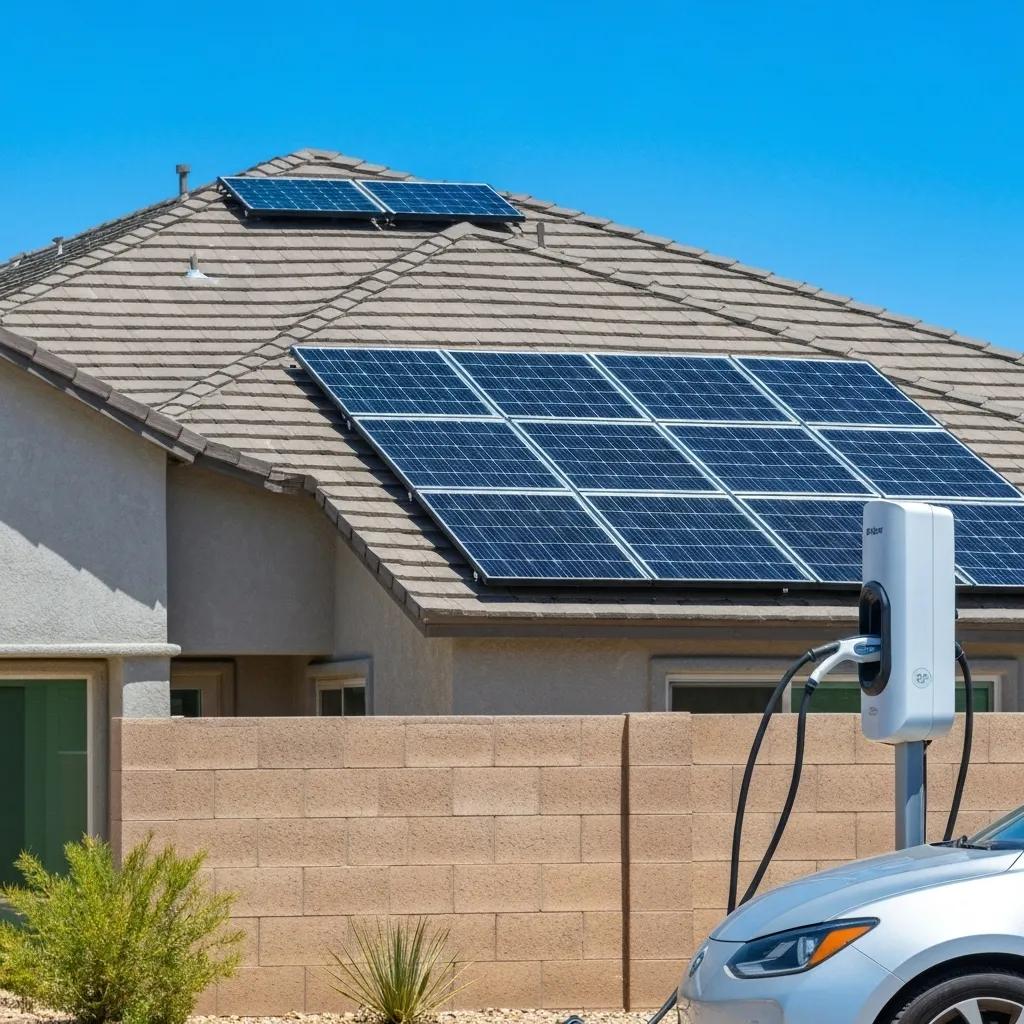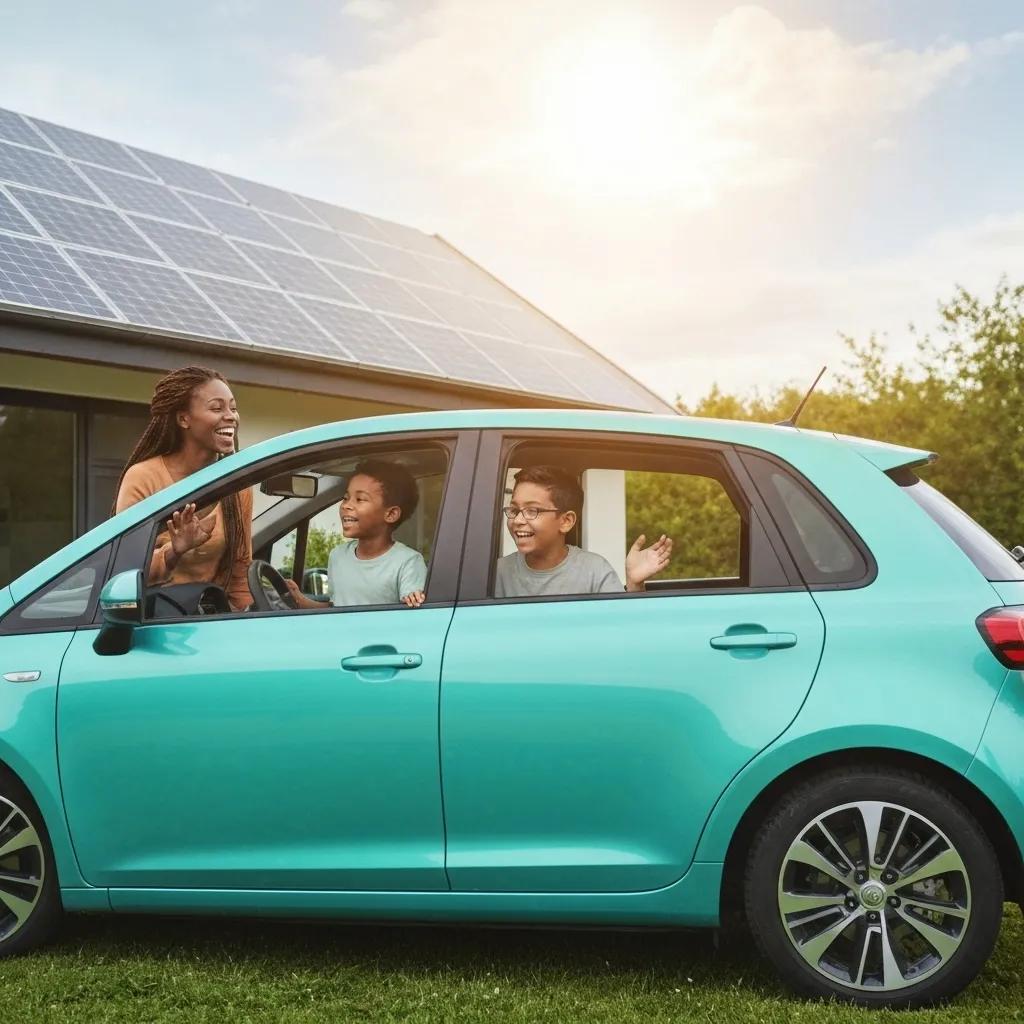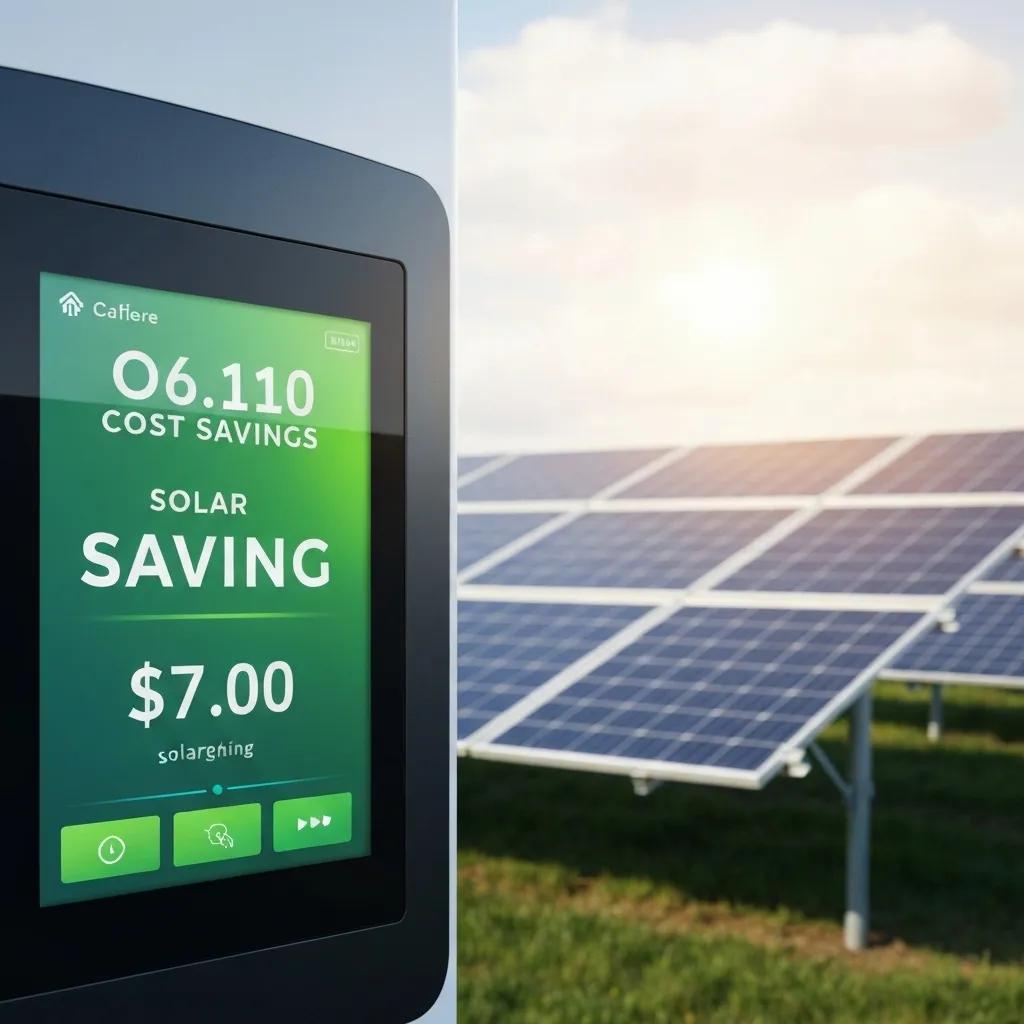
Complete Guide to Solar EV Charging in Las Vegas
Unlock true energy freedom and slash your long-term expenses by fueling your electric vehicle with the sun. For homeowners and businesses across Las Vegas, combining a custom solar array with an EV charger means significantly lower monthly power bills, less reliance on the grid, and a smaller carbon footprint. This guide is packed with practical advice on the perks, charger types, system sizing, installation steps, costs, incentives, and real-life success stories. It’s designed to equip you with the knowledge to make smart choices and get a free consultation from Vegas Solar LLC right from the start.
Inside this guide, you’ll find:
- The top reasons to charge your EV with solar, from independence to eco-friendliness
- The best charger options and how to integrate them smartly
- How to size your panels and batteries, plus how Nevada’s net metering helps
- A clear walkthrough of the installation process, electrical needs, and permits
- A transparent look at costs, financing, and how to maximize incentives
- Specific incentives, rebates, and programs available in Las Vegas and Nevada
- Real-life examples from homes and businesses, complete with customer feedback
Visit Vegas Solar LLC for a complete picture of integrated solutions early in your planning: https://vegasolarllc.com/.
Why Pair Your EV Charger with Solar Power? The Big Wins
Installing an EV charger that runs on solar panels brings you three major advantages: energy independence, significant cost savings, and a substantial reduction in greenhouse gas emissions. By linking solar power generation with dedicated EV charging equipment, you ensure your electric vehicle is always ready to go, boost your property’s value, and contribute to a more resilient community. These benefits touch every part of your energy use, from managing peak demand to being a good environmental steward. Let’s dive into how you gain autonomy, save money, and help the planet.
The Sunny Side of EV Charging: Why Solar Makes Sense
Studies show that using solar energy to charge electric vehicles dramatically cuts down on carbon emissions and energy expenses for drivers. When solar panels are integrated with EV charging systems, especially with smart charging tech that optimizes energy use and grid interaction, owners can expect considerable long-term savings.
This research backs up the article’s points about the environmental and financial advantages of powering your EV with solar energy.
How Does Solar EV Charging Boost Your Energy Independence?

Charging your EV with solar power means you’re generating your own electricity right at home, freeing you from unpredictable utility prices and grid reliability concerns. A solar setup designed for your driving needs produces clean energy that goes straight from your panels to your charger. This allows you to charge during off-peak hours and keeps you powered up even if the grid goes down. Gaining this level of energy autonomy means you’re less exposed to rate hikes and are building your own local energy system, setting you up perfectly for battery backup and round-the-clock power security.
What Kind of Savings Can You Expect with Solar-Powered EV Charging?

Switching to solar power for your EV charging dramatically cuts your transportation energy costs by replacing expensive grid electricity with free sunshine. Most households spend between $500 and $800 each year to charge an EV using grid power. With a well-sized solar EV setup, you can eliminate 75% to 100% of those charging expenses. When you factor in federal tax credits, state rebates, and net-metering benefits, the system often pays for itself in just 5 to 8 years. Over its 25-year lifespan, your cumulative savings could easily top $20,000, offering a fantastic return on investment and predictable energy costs.
How Does Solar EV Charging Help Reduce Your Carbon Footprint?
By charging your EV with solar energy instead of electricity generated from fossil fuels, you can cut your annual carbon emissions by more than 3 metric tons. Solar power produces zero operational emissions, unlike the natural gas and coal often used to generate electricity in Nevada. When you combine solar charging for your vehicle with solar power for your home, you create a complete low-carbon energy system that aligns perfectly with your sustainability goals and contributes to local climate efforts.
Choosing the Right EV Charger for Your Solar Setup
The best charger for you depends on how fast you need to charge, how much power your solar array produces, and how you manage your home’s energy. Level 2 chargers are usually the go-to for home solar systems, while DC fast chargers require much larger solar arrays and more advanced inverters. Smart chargers are game-changers, adjusting charging based on how much sun you’re getting and your battery levels, ensuring you use as much solar power as possible and draw minimally from the grid. Picking the right charger makes sure your solar energy works seamlessly with your EV.
What’s a Level 2 EV Charger and How Does It Work with Solar?
Level 2 chargers operate at 240 V and deliver between 3.3 kW and 11 kW, making them the standard choice for charging EVs at home throughout the day. When your solar inverter is set up to prioritize powering your home’s needs first, any extra energy from your panels can flow directly to your charger. This maximizes the solar power you use yourself and can be made even more efficient with smart load management systems that automatically direct surplus solar energy to your vehicle.
Can You Power DC Fast Chargers with Solar Energy?
Absolutely! DC fast chargers, which can deliver 50 kW to 350 kW, can be powered by solar energy, but they require substantial commercial solar arrays and on-site battery storage. These integrated systems combine large solar fields, bidirectional inverters, and battery banks to provide rapid charging while smoothing out the variability of sunlight. This setup is ideal for workplaces, commercial fleets, and public charging stations that need high-speed, sustainable charging without straining the grid.
How Do Smart EV Chargers Make the Most of Solar Energy?
Smart EV chargers are designed to communicate with your solar inverters and home energy management systems. They intelligently schedule charging sessions to coincide with peak solar production times. By constantly monitoring your solar panel output and battery charge levels, these chargers can increase charging speed when your home has more solar energy than it needs and slow down as the sun sets. The result is less electricity drawn from the grid, maximum use of your solar power, and automated energy balancing, all easily managed through an app or your home’s control system.
Sizing Your Solar System for EV Charging Demands
Getting your solar system size just right is key to ensuring your panels and batteries can meet your daily driving needs, account for seasonal sun variations, and cover your home’s energy use. Your calculations should factor in your EV’s efficiency (miles per kWh), how many miles you drive, your solar panels’ wattage, and the number of peak sun-hours in your area. Adding battery storage allows you to charge your EV when the sun isn’t shining, like overnight, and provides backup power. Understanding Nevada’s net-metering rules is also crucial for knowing how much credit you’ll get for any excess energy you send back to the grid.
How Many Solar Panels Do You Need to Charge an EV at Home?
To figure out how many panels you need, start by calculating your EV’s annual energy consumption in kWh. For instance, if you drive 12,000 miles a year and your EV gets 3.5 miles per kWh, you’ll need about 3,430 kWh annually. Divide that by the average 1,500 peak sun-hours in your area, and you’re looking at a roughly 2.3 kW solar array. That translates to about 8 to 10 panels, assuming each is 250 W. Remember to consider your home’s energy usage, your roof’s direction, and any potential shading to ensure your system performs consistently year-round.
What’s the Role of Battery Storage in Solar EV Charging?
Battery storage is essential for capturing excess solar energy, allowing you to charge your EV even when your panels aren’t producing power, such as in the early morning or late evening. A 10 kWh battery can typically provide enough power for 30 to 40 miles of EV range overnight, significantly reducing your reliance on the grid. For businesses, storage also helps manage demand charges and provides crucial backup power during outages, making your solar EV charging system more robust and valuable.
How Does Net Metering Work for Solar EV Charging in Nevada?
Nevada’s net-metering policy allows you to receive credits on your electricity bill for the solar energy you send back to the grid. These credits are typically applied at the retail rate of electricity, effectively offsetting the energy you use from the grid later. When your solar EV charging system generates more power than you need, that excess energy earns you credits, which can then be used to “pay” for charging your car overnight. NV Energy’s current rules allow for an annual true-up, meaning any unused credits roll over to the next year, further enhancing the financial benefits of your solar and EV investments.
Net Metering: Fueling Solar Adoption
Research consistently shows that net metering policies are a major driver for people adopting solar energy systems, including those used for EV charging. By crediting solar system owners for the surplus electricity they feed back into the grid, net metering significantly lowers their electricity bills and makes solar investments more financially attractive.
This information supports the article’s explanation of net metering and its positive impact on the financial advantages of solar EV charging.
Your Step-by-Step Guide to Installing Solar EV Charging
Following a clear installation process ensures everything is done safely, legally, and for maximum performance. It all starts with a no-cost consultation where our experts assess your roof, electrical system, and EV charging needs. Once we have your approval, we handle all the necessary permits, any required electrical upgrades, and final inspections. Finally, we integrate the EV charger with your solar inverter or electrical panel and get it set up for smart, efficient operation.
What Happens During Your Free Consultation and Site Assessment?
During your free consultation, the Vegas Solar LLC team will carefully examine your roof’s orientation and any potential shading, check your electrical panel’s capacity, and discuss your daily EV driving habits. We’ll review your current solar setup or propose a new system, talk about the best place for your charger, and go over financing options. You’ll leave with a personalized proposal, a system design, and a 3D layout of your panels, ensuring you know exactly what to expect.
Ready to get started? Visit our contact page to schedule your assessment: https://vegasolarllc.com/contact-us/.
What Electrical and Permit Requirements Are Needed for Installation?
Installing an EV charger typically requires a dedicated 40-60 Amp circuit with GFCI protection, all in compliance with NEC Article 625. Your local authorities will require building and electrical permits, agreements to connect to the grid, and final inspections. Our team manages all the paperwork, coordinates with NV Energy for net-metering applications, and ensures our installers are fully licensed and insured.
How Is the EV Charger Connected to Your Solar Power System?
Your EV charger can be wired into a sub-panel fed by your solar inverter or connected directly to a hybrid inverter that has a dedicated EV output. With hybrid systems, the inverter intelligently directs solar power to your home, your battery, and your EV charger based on real-time energy production. We use dedicated conduits and wiring to connect the charger to your electrical panel, and communication cables allow for smart controls that optimize your solar energy use.
The Investment: Cost of Solar EV Charger Installation
The total cost for a solar EV charging solution can vary depending on the size of the system, the type of charger you choose, and the specifics of your property. For homeowners, the combined cost typically ranges from $10,000 to $20,000 before any incentives are applied. For commercial installations with DC fast chargers, the cost can range from $75,000 to $250,000, depending on the power requirements and necessary infrastructure upgrades. However, with flexible financing and available incentives, the upfront cost can be significantly reduced, making solar EV charging accessible to a wide range of budgets.
What Factors Affect the Total Installation Cost?
Several factors influence the final price of your installation:
- The size of the solar array and the efficiency of the panels needed
- The power output of the charger (Level 2 versus DC fast charger)
- Whether your electrical panel needs an upgrade or if trenching is required
A solar array sized for Level 2 charging might cost between $12,000 and $16,000 before incentives. For fast-charging systems, additional costs for transformers, meters, and grid connection fees can increase the price, especially for commercial projects.
What Financing Options Are Available for Solar EV Charging?
We offer a variety of flexible financing options, including solar loans with no upfront payment required, equipment leases, and power purchase agreements (PPAs). Solar loans often come with repayment terms of up to 25 years and competitive interest rates, allowing your monthly payments to align with your energy savings. Equipment leases bundle the cost of solar panels and the EV charger into a single monthly payment. With PPAs, you can purchase the electricity generated by the system at a fixed rate without owning the equipment itself.
How Do Federal and Local Incentives Lower Installation Costs?
The federal solar Investment Tax Credit (ITC) allows you to deduct 30% of the combined cost of your solar system and EV charger through 2032. In Nevada, you can also take advantage of a $1,000 state tax credit for EV charging equipment, plus potential utility rebates of up to $500. For businesses, accelerated depreciation options can further reduce taxable income. When combined, these incentives can cut your net project costs by 40% to 50%, significantly speeding up your return on investment.
Nevada and Las Vegas Incentives for Solar EV Charging
Nevada and local utility providers offer a range of incentives that make installing solar and EV charging equipment even more attractive. When you combine federal, state, and utility programs, you can cover nearly half of the initial system cost. Staying up-to-date on program funding cycles and eligibility requirements is key to making sure you take advantage of every available credit and rebate.
Which Federal Tax Credits Apply to Solar-Powered EV Chargers?
The federal ITC, under Sections 48 and 25D, applies to both the solar array and the associated EV charging infrastructure for residential properties. By including the charger costs with your solar project expenses, homeowners can claim a single 30% tax credit on the total investment. Commercial entities can benefit from Section 179 deductions and bonus depreciation, which further reduce their taxable income.
What State and Local Rebates Are Available in Nevada?
Nevada provides several benefits for solar EV charging:
- A $1,000 residential tax credit specifically for EV charging equipment
- Exemptions from sales tax on solar equipment for eligible installations
- Potential property tax abatements on the increased value from solar installations in certain areas
Local counties might also offer faster permitting processes or reduced fees for combined solar and EV charging permits, potentially saving you 5% to 10% on soft costs.
How Do NV Energy Programs Support Solar EV Owners?
NV Energy offers a rebate program that provides $0.03 per kWh exported to the grid, with an annual cap, as bill credits. Their time-of-use (TOU) rate structures are also beneficial, offering lower electricity rates during off-peak hours, which can reduce your costs for charging your EV. Additionally, NV Energy provides demand-response programs that help commercial customers lower their demand charges by using smart charger controls.
Real-World Success Stories: Solar EV Charging in Las Vegas
Local case studies clearly show the real benefits of combining solar power with EV charging. Homeowners have reported cutting their annual EV fueling costs by as much as 90%, while businesses have enhanced their green image, attracting more environmentally conscious customers. Customer testimonials and performance data consistently highlight the reliability and financial advantages of powering your EV with solar energy.
How Have Homeowners Benefited from Integrated Solar EV Charging?
One homeowner in Henderson installed an 8 kW solar array paired with a Level 2 charger and achieved zero EV fueling costs in their first year. System data showed that 85% of their charging sessions were powered directly by solar, with the remaining energy needs met by net-metering credits. This installation also boosted their home’s value by an estimated $15,000 and reduced their carbon footprint by 2.8 metric tons annually.
What Commercial EV Charging Solutions Has Vegas Solar LLC Delivered?
Vegas Solar LLC installed a 100 kW solar canopy and two 50 kW DC fast chargers at a Las Vegas retail center. The project included battery storage to help manage demand charges, leading to monthly utility savings of $2,500 and attracting customers who value sustainability. Our custom analytics track charging activity and solar output in real time, showing an impressive 8-year payback period for the investment.
What Do Customers Say About Their Solar EV Charging Experience?
Vegas Solar LLC consistently receives a five-star rating on our BBB profile, with testimonials praising our systems’ performance and our team’s professionalism. Customers frequently mention prompt installations, clear communication throughout the process, and noticeable reductions in their energy costs. This external validation from the Better Business Bureau underscores our dedication to quality and reliability: https://www.bbb.org/us/nv/las-vegas/profile/solar-installation/vegas-solar-1086-90071178.
Investing in solar-powered EV charging is a smart move for your finances, your energy independence, and the environment. By choosing the right charger, accurately sizing your system, navigating the permits, and taking full advantage of available incentives, homeowners and businesses in Las Vegas can achieve excellent returns and greater energy security. Explore our flexible financing options, schedule your no-obligation site assessment today, and join the growing number of drivers who are powering their journeys with the abundant Nevada sun.